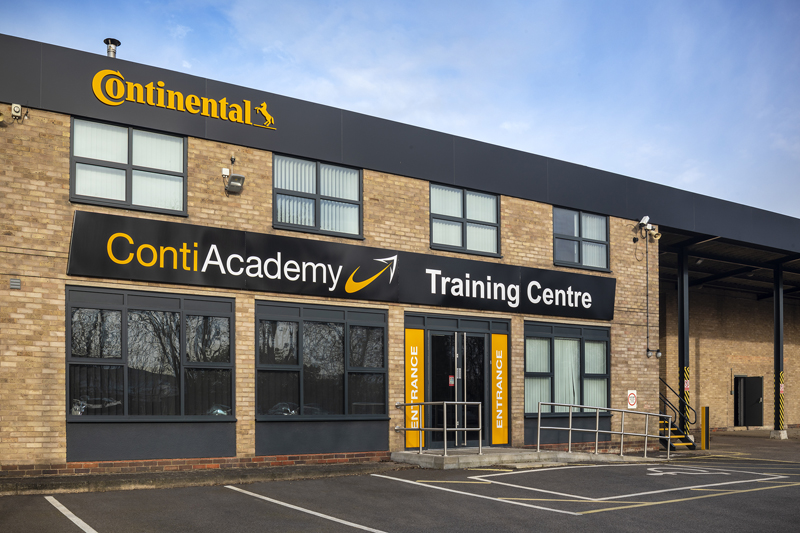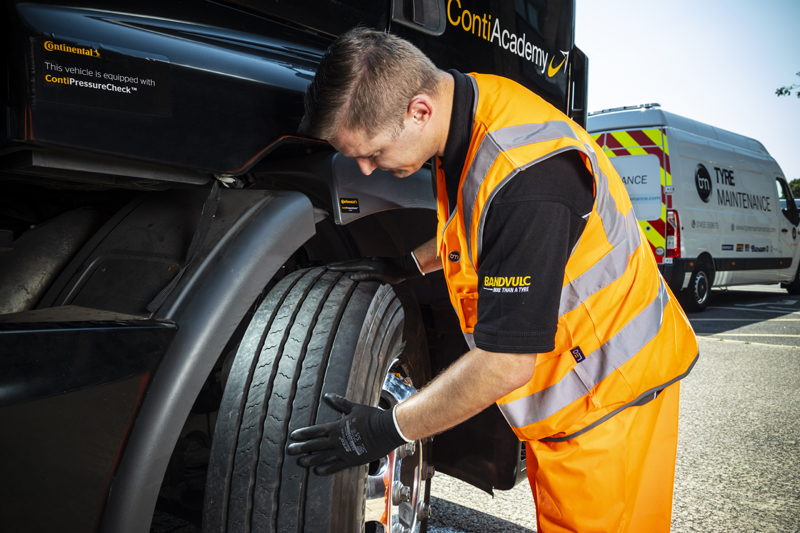
Continental Tyres has urged the road transport and tyre industry to invest in tyre technician training, to ensure the utmost safety on busy roadsides.
The buoyancy of the UK’s logistics industry, driven in no small part, by the rise of home delivery caused by the Covid-19 pandemic, means there are now more commercial vehicles and vans on UK roads than ever before. This rise in demand for consumer goods is great news for logistics fleets, yet the trickle-down effect on other professionals supporting the industry should not be forgotten.
Gwyn Fennell, Technical Service and Training Manager at Continental Tyres, manages the training portfolio at its UK-based ContiAcademy. He said it is incumbent on tyre service providers to ensure tyre technicians are adequately trained.
Gwyn commented: “The busier the logistics sector, the greater the need for qualified technicians to manage truck health and keep the vehicles on the road. Road networks are more dangerous with more fleets running, so the supporting fleet servicing agents are under pressure to provide these services.
“This can mean releasing tyre technicians for training gets pushed down the priority list – understandably, service agents need tyre technicians out on the road doing their job. However, this need to meet demand should not be to the detriment of ensuring adequately trained staff, without whom, the service providers could not operate.”
Commercial vehicle tyre technicians must hold a REACT licence (Roadside Emergency Action Concerning Technicians) to work safely at the roadside. This NTDA (National Tyre Dealer Association) licence has been backed by the Highways Agency and must be renewed by all tyre technicians irrespective of NTDA affiliation, every five years to remain valid.
Gwyn explained: “NTDA licensing was set up to ensure safe operational standards for tyre technicians, who attend increasingly dangerous roadsides, at any time of the day or night. The training requires tyre technicians to complete written coursework, a theory assessment and a practical observation. Obviously, this is a huge time commitment for tyre service providers, and there can be reticence to release tyre technicians to train.”
To help answer this need, Continental Tyres has created a training programme to fit around the specific needs of each business and every tyre technician – to help service providers offer real value to attendees and reduce time away from the business.
The ContiAcademy runs both conventional courses at its training facility in Lutterworth as well as hybrid courses, with theory-sessions held online, and the practical training undertaken at the customers site, all of which are aligned with national Covid-19 guidelines. The REACT hybrid course allows service providers to host practical assessments at their own facilities, where possible, allowing tyre technicians to complete assessments in specific time slots during the day, without the need for them taking an entire day away from work, and giving provision for several tyre technicians to be assessed on one day.

In addition, the ContiAcademy REACT training is based on a bespoke offering to meet the exact needs of each tyre technician.
Gwyn commented: “Some of the most professional, competent tyre technicians are not always the most comfortable in an academic environment and no one likes being tested.
“ContiAcademy’s teaching and assessment is based on the strengths of each candidate, who are assessed on the subject matter, and not their ability to understand the finer points of grammar or IT programmes.
“Our training also includes a pre-assessment, which helps us adjust the teaching to meet the candidate’s need and experience level, as well as a measure to track progress. Often service providers use these pre-assessments to understand the fundamental skills tyre technicians can meet when they begin employment.
“The bespoke ContiAcademy assessment format not only helps tyre technicians gain or refresh their REACT licence but it can pick up on any additional training needs, and generate a professional development plan for tyre technicians, to fulfil short, medium and long-term training requirements. This type of investment in tyre technicians can have an incredibly positive impact on tyre technicians and lead to greater staff retention for service providers.”
Tyre training to drive fleet efficiencies
As well as its REACT training, the ContiAcademy provides passenger-car tyre technician training, and a range of its own courses, designed to improve tyre husbandry for fleets of all sizes.
Gwyn added: “There is more to tyre knowledge that can benefit fleets than learning safe practices around fitting, because of the role tyres play in fleet efficiency. While tyres may only be directly responsible for 5% of a fleet’s total operating costs, they have an influence over a huge 40% of overall operating costs, because of the effect tyre rolling resistance has on fuel use and subsequent maintenance costs.
“With this in mind, there is logic in other transport stakeholders understanding a little more about their tyres. Fleet managers, responsible for managing tyre use, setting policy and negotiating supply contracts, would do well to find out how they can maximise tyre use as a route to improving fleet efficiency. This is even more important as tyres become more specialised for application. Fuel efficient tyres are designed to lower rolling resistance and so save fuel, however in the wrong application such tyres won’t perform, costing fleets money.”
ContiAcademy creates bespoke courses for a range of fleet operators, whether Continental customers or not, to drive such knowledge. The facility works with fleets who may not require tyre technicians on contract, but who need to train drivers or engineers in tyre husbandry, such as understanding how to get the most from their tyres by maximising service life, limiting damage and premature removal and optimal maintenance. This is equally beneficial for operators of light commercial vehicle fleets as well as heavy duty vehicle fleets.
Gwyn concluded: “Just as ContiAcademy trains tyre technicians so they can understand service level agreements, to fully appreciate how the tyres they fit will be used, we see real value in arming fleet managers with information on how tyres work. The broader their understanding, the more chance they have to drive down operational costs and ensure they get the best value out of the tyres for their fleet.”








